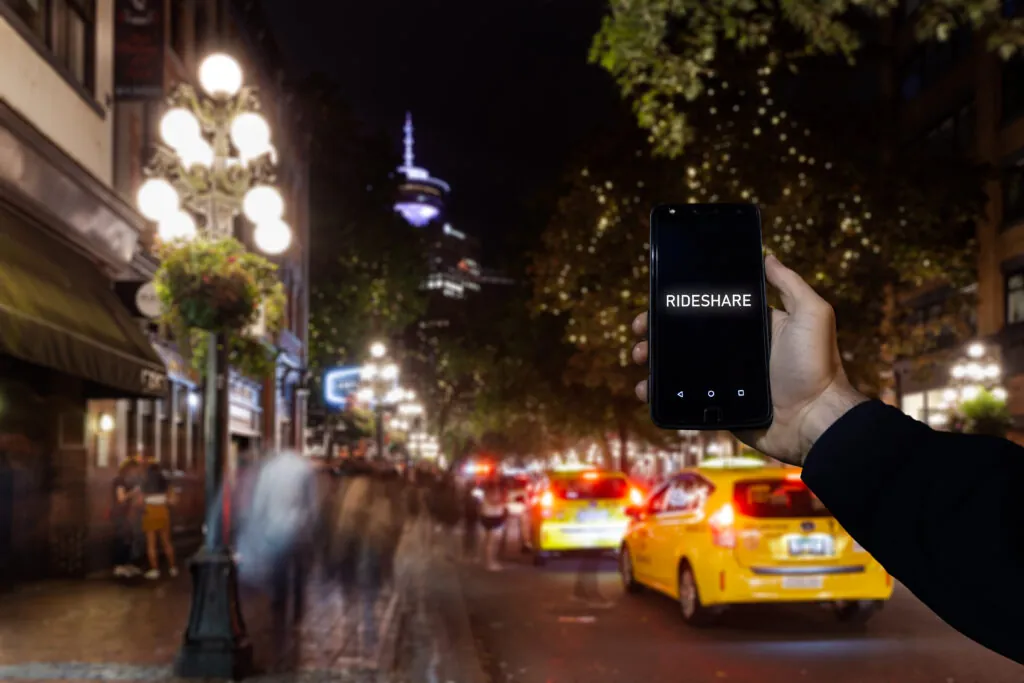Am I Entitled to Compensation if a Rideshare Driver Hit my Car?
A Rideshare Driver Hit My Car — Can I Get Compensated?
With the growing popularity of rideshare services like Uber and Lyft, accidents involving rideshare drivers are becoming more common. If you’ve been in a rideshare accident, you might wonder: Who is responsible for covering the damages? Understanding the liability process, insurance coverage, and legal options can help you take the right steps.
This article provides a comprehensive guide to rideshare accident claims, explaining who is at fault, how insurance works, and what compensation you may be entitled to. Whether you’re a passenger, driver, or third party affected by an accident, this guide will help you navigate the claims process.
Determining Who Is at Fault in a Rideshare Accident
The first step in any accident claim is determining who was responsible. Liability affects whose insurance will cover the damages and what kind of compensation you may receive.
If the Rideshare Driver Was at Fault
If the rideshare driver caused the accident, the insurance policy covering the damages depends on the driver’s status at the time of the crash:
- Offline or Not Logged Into the App → The driver’s personal auto insurance applies.
- Logged In but Without a Passenger or Ride Request → Uber and Lyft provide limited liability coverage:
- $50,000 per person for injuries
- $100,000 per accident for injuries
- $25,000 for property damage
- En Route to Pick Up a Passenger or During a Ride → The rideshare company’s full commercial insurance policy applies, which includes:
- $1 million liability coverage
- Contingent collision coverage (if the driver has their own collision insurance)
If You Were at Fault
If you were responsible for the accident (e.g., if you hit a rideshare driver’s car), your own auto insurance policy will cover damages. If you have collision coverage, your insurance will pay for your vehicle repairs. However, if you are found at fault for injuries to passengers or the rideshare driver, you could be liable for medical expenses and other damages.
Rideshare Insurance Coverage: What You Need to Know
Rideshare companies provide different levels of insurance coverage depending on what stage the driver was in at the time of the accident.
Stage 1: Offline or Not Logged In
- Who Pays? The driver’s personal auto insurance applies.
- Rideshare Company Coverage? No. Uber and Lyft do not provide coverage if the driver is offline.
Stage 2: Logged In but Waiting for a Ride Request
- Who Pays? The rideshare company provides limited liability coverage:
- $50,000 per person for injuries
- $100,000 per accident
- $25,000 for property damage
- Does It Cover the Driver’s Car? No. The driver’s personal policy must cover their own damages.
Stage 3: En Route to Pick Up a Passenger or During a Ride
- Who Pays? The rideshare company provides full commercial insurance with:
- $1 million liability coverage
- Contingent collision coverage (if the driver has collision insurance)
- Does It Cover the Driver’s Car? Yes, but only if the driver has personal collision coverage.
If you were a passenger in the rideshare vehicle, you are covered by the rideshare company’s $1 million liability policy if the rideshare driver was at fault.
What Compensation Can You Seek After a Rideshare Accident?
If you’ve been in a rideshare accident, you may be entitled to financial compensation. The types of damages you can claim depend on the severity of the accident and your role (passenger, driver, or third party).
Types of Compensation Available
Property Damage
- Vehicle repairs or replacement (if your car was damaged).
- Damage to personal belongings inside the vehicle.
Medical Expenses
- Hospital bills, surgery, and rehabilitation costs.
- Future medical expenses related to the accident.
Lost Wages
- If the accident caused you to miss work, you can seek compensation for lost income.
Pain and Suffering
- Emotional distress, trauma, and loss of quality of life.
- Physical pain due to injuries sustained in the accident.
What If the Rideshare Driver Was Uninsured or Underinsured?
If the driver lacked proper coverage, Uber and Lyft provide uninsured/underinsured motorist coverage to protect passengers and third parties.
How to File a Rideshare Accident Claim
If you’ve been in an accident involving a rideshare vehicle, follow these steps to protect your rights and maximize your compensation:
Get the Rideshare Driver’s Insurance Details
- Ask for their personal auto insurance and rideshare company insurance details.
- If the driver refuses to provide insurance information, report it to Uber/Lyft directly.
File a Police Report
- A police report helps establish fault and serves as critical evidence for insurance claims.
- Contact local law enforcement immediately after the accident.
Notify Your Insurance Company
- Report the accident to your own insurance provider, even if you were not at fault.
- Your insurance company may coordinate with the rideshare company’s insurance for your claim.
Determine Whose Insurance Applies
- If the rideshare driver was logged in or on a ride, Uber/Lyft’s commercial insurance policy may cover damages.
- If the driver was offline, their personal auto insurance applies.
Consider Hiring a Lawyer
- If your claim is denied, delayed, or undervalued, consult a personal injury attorney.
- A lawyer can negotiate with insurance companies and ensure you receive fair compensation.
Frequently Asked Questions: Common Questions About Rideshare Accidents
Does Uber or Lyft Always Cover Rideshare Accidents?
Not always. Coverage depends on the driver’s status in the app. If the driver was offline, their personal insurance applies.
What Should I Do If an Uber or Lyft Driver Hits My Car?
Exchange insurance information, file a police report, and determine whether Uber/Lyft’s limited or full liability coverage applies.
What If I Was a Passenger in a Rideshare Car During an Accident?
Passengers are covered under Uber/Lyft’s $1 million liability insurance. You may file a claim against the rideshare company.
Can I Sue Uber or Lyft After an Accident?
In most cases, Uber and Lyft are not directly liable for accidents since drivers are independent contractors. However, you can file a claim against their insurance policy.
Protecting Your Rights After a Rideshare Accident
Rideshare accidents can be complex, involving multiple insurance policies and liability factors. Whether you were a passenger, rideshare driver, or third-party driver, understanding how insurance applies is crucial in securing the compensation you deserve.
If your claim is denied or if you’re struggling with medical expenses, lost wages, or pain and suffering, consider reaching out to a personal injury attorney who specializes in rideshare accident cases.
Need Legal Help? Contact Rafferty Domnick Cunningham & Yaffa Today!
If you’re facing insurance delays or unfair claim denials, a qualified rideshare accident attorney can fight for your rights. Don’t wait—schedule a free consultation to explore your legal options. Contact Rafferty Domnick Cunningham & Yaffa today.



